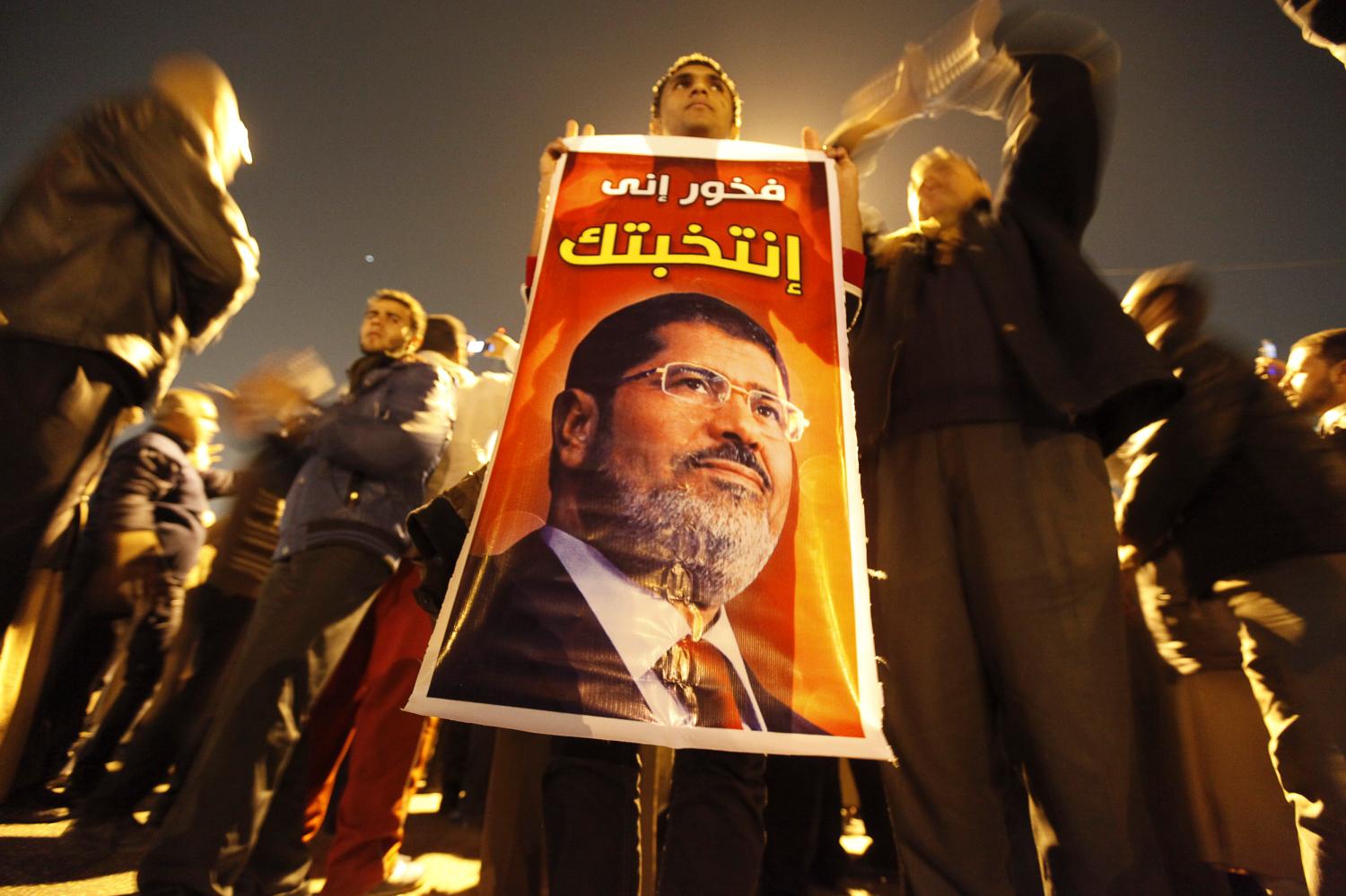Content from the Brookings Doha Center is now archived. In September 2021, after 14 years of impactful partnership, Brookings and the Brookings Doha Center announced that they were ending their affiliation. The Brookings Doha Center is now the Middle East Council on Global Affairs, a separate public policy institution based in Qatar.
The United States has been resolutely focused on maintaining the Egyptian-Israeli peace treaty. While Egypt’s President Mohamed Morsi has signaled he is willing to set aside the Muslim Brotherhood’s ideological opposition and most Egyptians’ hostility to Israel, several factors could destabilize the situation. Shadi Hamid and Tamara Cofman Wittes drafted this memorandum to President Obama as part of
Big Bets and Black Swans: A Presidential Briefing Book
.
- How should the U.S. engage with President Morsi to preserve peace between Egypt and Israel?
- What can the U.S. do to improve communications between Egypt and Israel?
- How should the U.S. prepare for a scenario in which the treaty breaks down and there is a direct confrontation?
Download Memorandum
(pdf) |
Download the Presidential Briefing Book
(pdf)
TO: President Obama
FROM: Tamara Cofman Wittes and Shadi Hamid
Since the fall of Hosni Mubarak in February 2011, the United States has been resolutely focused on maintaining the Egyptian-Israeli peace treaty as a cornerstone of regional stability and as an essential platform for broader efforts at Arab-Israeli coexistence. The loss of this 33-year-old treaty would represent a profound strategic defeat for the United States in the Middle East.
Recommendation:
To mitigate such a possibility you should take immediate steps to deepen U.S. engagement with the Morsi government, the Egyptian military and opposition forces; consider negotiating new Israeli-Egyptian agreements to address each side’s grievances about Sinai security; promote better communication and confidence building measures between the Egyptian and Israeli militaries; and be ready to intervene immediately should a crisis erupt.
Background:
Egyptian President Mohamed Morsi’s decision to mediate a cease-fire between Israel and Hamas in November 2012 signaled that he was willing to set aside the Muslim Brotherhood’s ideological opposition and most Egyptians’ hostility to Israel in favor of a pragmatic raison d’etat. Nevertheless, there are several possible ways by which the Egyptian-Israeli peace treaty might be ruptured.
Third-party terrorist attacks in Sinai or emanating from Gaza could draw in Israeli and Egyptian troops and rupture relations. In August 2011, for example, a terrorist attack led Israeli forces on a hot pursuit into Sinai, during which they killed five Egyptian soldiers. This generated heated demonstrations outside the Israeli embassy in Cairo. That incident took place under the military council’s rule; a future incident would take place under a democratically-elected government that would face strong popular pressure to respond, provoking a further crisis and threatening the treaty itself. While Israel has been careful since then to avoid any provocation in Sinai, it has also watched continued terrorist activity there, and Egypt’s inability or unwillingness to tackle it, with growing alarm. At the end of the day, Israel will insist on its right to self-defense. Terrorists and others with an interest in creating a crisis could easily provoke an incident in a location that would heighten the chances for a direct Israeli-Egyptian military confrontation.
Even without a border incident, an elected, Muslim-Brotherhood-led government might resort to populist nationalism to sustain support for its rule. While the international community saw Morsi’s diplomacy in Gaza as a signal that an Islamist-led Egypt would act responsibly to reinforce regional stability, his opponents in leftist and revolutionary circles attacked him for working within the Mubarak framework of relations with Israel. Even Morsi’s own Brotherhood has taken a harder line than he, as for example in August 2012 when it claimed that a recent terrorist attack on Egyptian soldiers in Sinai was a “Zionist” plot. In the coming years, Morsi’s opponents are likely to make greater use of anti-Americanism and anti-Israel sentiment to attack the Brotherhood in the court of public opinion (just as the Brotherhood did to Mubarak).
Moreover, the touch policy measures required to stabilize the Egyptian economy will worsen the pain of average Egyptians, making populist policies, and particularly adventurism abroad, a tempting distraction for an increasingly unpopular government. A continued failure to address deteriorating Israeli-Palestinian relations could also spark further violence between Hamas and Israel or a collapse of the Palestinian Authority, exacerbating anti-Israeli sentiment in Egypt. Meanwhile, the Egyptian government security-focused approach to Sinai’s problems relies on ham-handed repression while failing to invest the necessary resources to promote local development and reduce local grievances. This increases the incentives for locals to participate in violence. Morsi and the Brotherhood cannot be expected to continue to confront increasing public pressure over these issues without any impact on cooperation with Israel. At some point, the temptation to make a symbolic move against the treaty could become too strong to ignore. Morsi might then demand amendments to the treaty or put it to a popular referendum. He might also seek to address both security threats in Sinai, and perceived slights on Egyptian sovereignty there, by moving additional forces into zones where the Treaty restricts forces without Israeli consent.
Should Morsi be tempted to use hostility toward Israel to bolster his domestic standing, this will only persuade Israeli officials that their worst fears about the Arab Spring are being realized. Any Egyptian move to undermine the Treaty would be seen as implying a sharp decrease in Israel’s deterrent capabilities, and would likely produce a sharp response.
Israel is already nervous. Since Egypt’s revolution, Israel has acquiesced in Egypt’s remilitarization of eastern Sinai, accepting a semi-permanent Egyptian presence close to its border. At the same time, Israel has doubled the number of battalions it has deployed along the border, built a border fence, and established a new “Southern Brigade” to defend Eilat. In the context of anti-Israeli populism, any Egyptian military move that Israel does not know about or approve could easily provoke suspicion and a matching Israeli military mobilization intended to send a signal about the costs of abandoning the treaty. But given the already-increased troop presence and the limited communication between the two sides, such a scenario heightens the chances for unintended escalation.
Preventing a Peace Treaty Rupture:
There are steps you should take now to reduce the chances that terrorist provocations or populist moves by Egypt’s leadership might end in the rupture of the Treaty:
• Deepen U.S. security cooperation and coordination with the Morsi government so that, even in the event of growing anti-Israel agitation inside Egypt or a terrorist provocation in the Sinai, Morsi and the Brotherhood feel they have a vital stake in not upsetting the bilateral relationship.
• Sustain and expand U.S. engagement with the Egyptian military and with political actors across the Egyptian spectrum, in the course of which administration officials should extol the benefits of peace with Israel for Egypt’s stability and economic recovery. In order to avoid the perception of a Mubarak-style authoritarian bargain, your embassy in Cairo should balance its cooperation with Morsi with broader political outreach and sustained pressure on the Brotherhoodled government to promote inclusive democracy.
• Consider developing a new Egypt-Israel modus vivendi that would enhance the sustainability of the peace treaty. Israel is not happy with the very limited bilateral communications over Sinai and Gaza, which occur through a high-level intelligence channel; Egypt is unhappy with the Treaty’s limitations on forces in Sinai. These limitations may also no longer meet the needs of the two parties when the primary security threat is non-state terrorism and illicit activity. A revised agreement that codifies the alreadyaltered realities on the ground, and that adds more robust bilateral information sharing and coordination mechanisms, could potentially relieve pressures on the Treaty within Egyptian politics, while better serving both sides’ security interests.
• Press now for increased communication between Egyptian and Israeli militaries. Those operating along their shared border must have some direct means to share information in the event of a crisis. You can also work to enhance the role of the Multinational Force Observers in Sinai (MFO). Currently, limited numbers and capabilities as well as security concerns restrict MFO movements. A larger, more mobile and capable force could improve information sharing and verify that new Egyptian deployments in Sinai are sized, equipped, and operating according to agreements. This would also lessen Morsi’s ability to “surprise” Israel with any new military deployments, reducing his incentive to do so.
Minimizing Fallout in the Event of Further Deterioration:
In extremis, if the treaty is broken, or if tensions flare to the point that cross-border fighting is conceivable, you should be ready to act quickly to:
• Deter both sides from a direct confrontation, or bring one to a swift end. Since the Egyptian military is unlikely to seek allout war with the far-superior Israeli Defense Forces, it may welcome U.S. intervention. This could involve seeking an immediate separation of forces monitored by MFO, and, if necessary, putting nearby U.S. forces on alert to deter aggressive movements by either side in advance of such a separation taking hold. The temptation in Washington might be to declare swift and clear support for Israel’s defense. But in a case where extreme nationalism is driving Egyptian actions this would not itself act as a deterrent to further escalation.
• Prevent terrorist elements in Sinai or Gaza from taking advantage of the crisis to fire rockets or breach Israel’s borders. Success in this objective will require getting both Egypt and Israel focused on the primacy of the terrorist threat: pressing Egypt to back down swiftly, urging Israeli restraint in response to provocations, and mobilizing third-party channels to Hamas in Gaza warning against such moves.
• Prevent an Egyptian-Israeli rupture from having ripple effects in the region. The United States should engage swiftly and firmly with Arab capitals, especially in the Gulf, to head off any statements of support for Egyptian actions against the treaty and to elicit public and private messages expressing a desire to maintain regional peace. Jordan’s peace treaty with Israel would become an immediate target should this effort fail, and the United States as well as our Gulf allies should seek to demonstrate their support for the maintenance of Jordan’s peace with Israel in the face of what could be a fierce nationalist onslaught.
The Brookings Institution is committed to quality, independence, and impact.
We are supported by a diverse array of funders. In line with our values and policies, each Brookings publication represents the sole views of its author(s).





